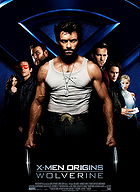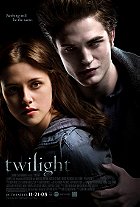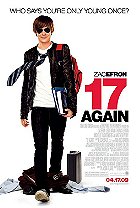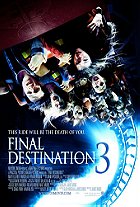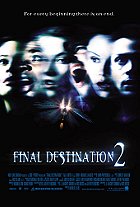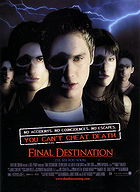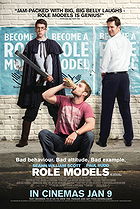As the title implies, High Fidelity is a quirky, humorously philosophical romantic comedy driven thematically by music - in other words, music matters to the protagonists and more or less defines them. Containing over 50 credited songs, this is a pop-music-soaked study of failed relationships (and the obsessive elitism of pop-culture fanatics) through the eyes of a music geek. This filmic appropriation of Nick Hornby's 1995 novel probably seemed like a daft idea on paper, as the setting was altered from London to Chicago and the decidedly British tone would be difficult to retain. Yet, against all odds, director Stephen Frears and co. have crafted an appealing, engaging, witty, smart meditation on the prattles of sex; retaining the attitude of the novel and adding a broader, more accessible feel. Hornby's amusing and undeniably honest insights into the male condition remain intact in this cinematic adaptation as well. High Fidelity is also extraordinarily well-crafted - it entertains from the very first shot 'til the closing credits, the script is terrific, performances are zingy all-round, and Frears' direction is inspired.
The story primarily concerns reflection, self-discovery and realisation about the nature of love. It additionally concerns (and is in a way for) those obsessed with pop culture - books, music, movies, etc.
Rob Gordon (Cusack) is an underachieving former DJ seemingly cursed with a romantic hex. Ever since a brief liaison under the football benches as a kid, his love life has been catastrophic. Speaking directly to the camera, Rob takes us on a guided tour of his life; mulling over his favourite music and the bittersweet history of his romantic failures. Rob is a downright music enthusiast - his apartment is lined with shelves of coveted vinyl records, and he owns his own (failing) record store 'Championship Vinyl'. He begins going through a crisis of self-confidence when his latest girlfriend Laura (Hjejle) dumps him. Rob proceeds to recount his top five most memorable break-ups of all time, reflecting on his romantic troubles to determine why his relationships are so luckless.
To capture the freewheeling style of Hornby's book, director Frears is heavily dependent on direct-to-camera addresses and voiceovers which are initially jarring. However, with Cusack's eminent amiability functioning as a conduit, one can eventually slide into the movie's rhythms and get drawn into Rob's little universe. Not a lot actually occurs throughout the course of the film, and it can't eschew the clichés, but it's the way director Frears tweaks it that makes it seem fresh and welcome. In a meandering fashion that could easily alienate an audience accustomed to action pictures and broad comedy, High Fidelity takes us inside Rob's struggling record business; cinematographer Seamus McGarvey's camera spending a great deal of time tracking events occurring inside the store. Rob specialises in vinyl records of pop music, and his two workers Dick (Louiso) & Barry (Black) are willing to work voluntarily for twice the time that they were hired to do. The comedy succeeds because the makers are aware that they must create well-drawn characters a viewer can come to care about in order to stage a successful humorous situation. High Fidelity finds the delicate balance between hilarity and dramatic resonance, without ever resorting to character caricaturisation or going over the top in its depiction of true-to-life situations (perhaps once, granted, when three different takes are presented of a confrontation between two characters).
High Fidelity pays particularly astute attention to the typical life of an aging Generation-X male in contemporary society; absolutely nailing even the smallest details of his existence with droll, sagacious charm, such as those cruel, nagging phone conversations between mother and son. From its observant take on late twenty-something romance, to its faultless recreation of the record store set and music scene (not to mention the terrific portrayal of the denizens dwelling within), High Fidelity does virtually everything right. There are countless wonderfully original, touchingly funny scenes. The humour is wry and clever, and the movie maintains a generally upbeat tone. It also occasionally toys with the significance of pop music to a person's psychological development. There's even a slight hint of Woody Allen in the project (from the neuroses of the protagonist to the Annie Hall-type dissection of a dud romance), but without the stigma some movie-goers attach to Allen's excellent oeuvre. Due to its quirky characters, smart dialogue, and sporadic bursts of incisive humour, High Fidelity stands out as a small movie that deserves wide exposure.
The distinguishing point of High Fidelity is that it's much closer to the authentic feel of British films as opposed to the crisp perfection of Hollywood. All of the characters come across as actual people not unlike those you'd encounter in a record store. The first-rate screenplay was written in part by John Cusack who also stars as the protagonist. Cusack is an apt choice; admirably pulling off Rob as both a character and as a narrator. The "breaking the fourth wall" technique seems completely natural. He constantly addresses the audience via narration or speaking directly to the camera, but it never feels excessive thanks to his boundless geniality. Cusack's character is clearly miserable, yet he never craves too much sympathy - he recognises our intelligence. Your tolerance of High Fidelity will most likely depend on your tolerance of the lead actor.
While Cusack is excellent in the title role, there's a gallery of supporting actors who wonderfully make their mark. Jack Black and Todd Louiso absolutely steal the show as two socially-inept clerks working at Rob's vinyl shop who live and breathe pop music, and spend their days arguing about pop trivia while comparing various "top 5" lists. These guys have their music aficionado characters nailed down to a tee. Jack Black is a particular stand-out; his characterisation of Barry is full of energy and attitude, and he imbues every line with comic punch. One of the film's best scenes features Barry ferociously telling off a middle-aged man looking to buy I Just Called to Say I Love You for his daughter.
Relatively unknown Danish actress Iben Hjejle is believable and likeable as Rob's latest girlfriend. Despite little experience as an actress in American movies, she's clearly mastered her American accent. Beyond these characters, there's merely a bunch of cameos from a variety of actresses. Catherine Zeta-Jones is the most memorable for fairly obvious reasons. Lisa Bonet is also appealing for every frame in which she appears, and John Cusack's sister Joan (a frequent guest in her sibling's movies) is predictably good as Rob's pal Liz. Look out for Tim Robbins as well, who's visibly enjoying himself (this is contagious).
High Fidelity is a charming, whimsical little film that perfectly captures the temperament of retail folks who are both knowledgeable and passionate about their product, and who prefer discussing their commodity as opposed to being paid for it. This is a fantastic flick; an excellently-constructed romantic comedy for the pop generation. The characters inhabiting the picture are believable and very well developed, and the performances are strong. The humour is sharp and witty; never feeling forced. The accompanying soundtrack is scene-appropriate and extremely enjoyable. It even rightfully recognises Evil Dead II as the cinematic classic it truly is. On top of this, a boundless energy pervades the movie - there's hardly a dull moment at any stage during the 110-minute runtime. High Fidelity also succeeds because it deeply taps into the male psyche with an emotional honesty that anchors the drama and ensures the characters (Dick and Barry included) are never treated as caricatures. It's fairly clichéd, but Frears' terrific direction strongly distracts us from the unoriginality. All things considered, High Fidelity is high value cinema and it's simply a delightful way to spend a couple of hours.
9.0/10
 Login
Login
 Home
Home 183 Lists
183 Lists 1674 Reviews
1674 Reviews Collections
Collections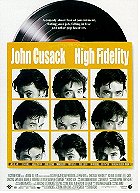
 0 comments,
0 comments, 